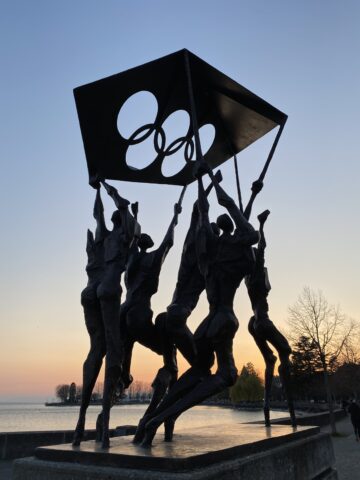SFT Judgment 4A_600/2016 – Platini v. FIFA – Violation of the FIFA Code of Ethics
The Issue
No legal basis for a payment to a FIFA official (Mr. Platini) – violation of the FIFA Code of Ethics. Domestic arbitration in Switzerland; Arbitrariness of a CAS award in its result
Facts
The case involved Mr. Michel Platini, UEFA President until 2016, who filed an appeal against a CAS award partially upholding the decision of the FIFA Appeal Committee and banning Mr. Platini from all football-related activities for four years. The FIFA Ethics Committe initially banned Mr. Platini for eight years by the FIFA Ethics Committee over a CHF 2’000’000 payment made by the former FIFA President Joseph Blatter to Mr. Platini in 2011 for consultancy work carried out for FIFA from 1998 until 2002. The FIFA Appeal Committee subsequently reduced the sanction to six years and Mr. Platini appealed against this decision to the CAS, which in turn reduced the sanction to four years. In summary, the FIFA Decisions had found no legal basis for such payment, thereby violating the FIFA Code of Ethics.
Eventually, Michel Platini filed a motion to set aside the CAS Award invoking solely the arbitrariness of the decision, a ground for appeal provided for only in domestic arbitration procedures under Article 393 CPC.

Takeaways from the Swiss Federal Tribunal judgment
I. The preliminary issue of “domestic arbitration” in Switzerland (Art. 393 CPC)
In its lengthy judgment, the Federal Tribunal extensively analyzed the preliminary issue of “domestic arbitration” in Switzerland, and specifically the pertinent criteria in order to define an arbitration as domestic but also the scope of review, by the Federal Tribunal, of the arbitral award under Art. 393 lit. e CPC. More specifically, an arbitration is treated as domestic when the arbitral tribunal has its seat in Switzerland and Chapter 12 of the LDIP does not apply (4A_600/2016 at 1.1), the pertinent time for the determination of the domicile or habitual residence of the parties being that of the conclusion of the arbitration agreement. In this case, although both FIFA and the CAS had their seat in Switzerland and Mr. Platini was also domiciled in Switzerland when the appeal was filed, the only decisive factor was Mr. Platini’s domicile at the time of the conclusion of the arbitration agreement.
In view of the particularities of sports arbitration in disciplinary matters (where jurisdiction does not arise directly from the conclusion of an arbitration agreement), the Federal Tribunal set the pertinent time for the conclusion of the arbitration agreement in 2004, the year the FIFA Statutes recognized CAS’ jurisdiction. At that time Mr. Platini was still domiciled in France. However, since the CAS Panel proceeded to an (incorrect) qualification of the arbitration as domestic and FIFA did not object to it, such qualification had become binding upon the parties and FIFA could no longer raise any objections without violating the principle of good faith.
II. The control of arbitrariness of the CAS Award
Overall, this is one of the very few cases related to CAS that was adjudicated under the domestic arbitration rules of the CPC (see also 4A_627/2011 of 3 August 2012, which however related to Art. 393 lit. c CPC). It is true that the scope of review of an arbitral award is more extended in domestic arbitration when the ground of arbitrariness is invoked, a ground that has no counterpart in international arbitration (public policy is a more restrictive concept than the one of arbitrariness).
Nonetheless, it is still difficult to overcome this burden and the party claiming that the award is arbitrary in its result must establish that the award is either contrary to the law or based on findings that evidently contradicted the record. The Federal Tribunal concluded that the CAS award was not arbitrary after analyzing all the allegations of arbitrariness raised by Mr. Platini (application of the incorrect version of the applicable FIFA regulations; incorrect interpretation of the FIFA Code of ethics; reversal of the burden of proof).
III. The control of arbitrariness of the CAS Award – the proportionality of the sanction
Another interesting issue concerned the proportionality of the sanction. Accordingly, neither the prohibition to take part in any activity related to football nor its duration (for a period of 4 years) were found to be in violation with Art. 27 CC, Art. 163 CO and Art. 4 CC argued by Mr. Platini. More specifically, the lack of precision of the sanction (“any activity relating to football”) was not sufficient to annul the contested award. In any event, if FIFA had sanctioned Mr. Platini for actions that were not prohibited under the FIFA Code of Ethics, such decision could be annulled in appeal.
The Federal Tribunal equally distinguished this case from the Matuzalem judgment (ATF 138 III 322, the only judgment found to have violated substantive public policy), due to the fact that the Matuzalem judgment concerned a statutory penalty imposed on an active professional Brazilian footballer and the threat of an unlimited ban on practicing his profession in the case where he would not pay a compensation in excess of EUR 11 million at short notice.
Key words
Swiss Federal Tribunal; CAS award; football; breach of the FIFA code of ethics; undue advantage; domestic arbitration; Art. 393 CPC; difference from international arbitration; arbitrariness of the award (no); applicable version of the FIFA regulations; reversal of the burden of proof; proportionality of the sanction.
Note: the full judgment is available in French at the website of the Swiss Federal Tribunal www.bger.ch. The English translations of the Swiss Arbitration Decisions (from French, German and Italian) are available on the website www.swissarbitrationdecisions.com , operated jointly by Dr. Despina Mavromati and Dr. Charles Poncet as a service to the international arbitration community.





